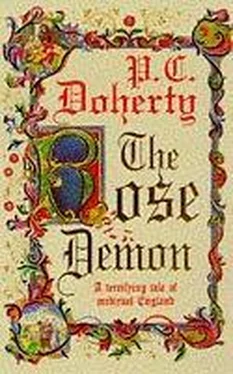Paul Doherty - The Rose Demon
Здесь есть возможность читать онлайн «Paul Doherty - The Rose Demon» весь текст электронной книги совершенно бесплатно (целиком полную версию без сокращений). В некоторых случаях можно слушать аудио, скачать через торрент в формате fb2 и присутствует краткое содержание. Жанр: Исторический детектив, на английском языке. Описание произведения, (предисловие) а так же отзывы посетителей доступны на портале библиотеки ЛибКат.
- Название:The Rose Demon
- Автор:
- Жанр:
- Год:неизвестен
- ISBN:нет данных
- Рейтинг книги:5 / 5. Голосов: 1
-
Избранное:Добавить в избранное
- Отзывы:
-
Ваша оценка:
- 100
- 1
- 2
- 3
- 4
- 5
The Rose Demon: краткое содержание, описание и аннотация
Предлагаем к чтению аннотацию, описание, краткое содержание или предисловие (зависит от того, что написал сам автор книги «The Rose Demon»). Если вы не нашли необходимую информацию о книге — напишите в комментариях, мы постараемся отыскать её.
The Rose Demon — читать онлайн бесплатно полную книгу (весь текст) целиком
Ниже представлен текст книги, разбитый по страницам. Система сохранения места последней прочитанной страницы, позволяет с удобством читать онлайн бесплатно книгу «The Rose Demon», без необходимости каждый раз заново искать на чём Вы остановились. Поставьте закладку, и сможете в любой момент перейти на страницу, на которой закончили чтение.
Интервал:
Закладка:
Rahere, the royal clerk, swaggered down the King’s Steps at Westminster and into the waiting barge. The wherrymen, dressed in the royal livery, took one look at the chancery ring on his left hand and the red sealed warrant in the other and ushered him to the cushioned seat in the stern as if he were the King himself. Royal clerks ruled the roost. They were the King’s lawyers, his money-men, the searchers out of his prerogative. They had the power of the Chancery and, on their advice, a man rose or fell. This clerk looked the part: tall, elegantly dressed in a soft, woollen tunic, hose of the same colour and texture and high-heeled morocco boots, he gathered his cloak about him and lounged in the stern. Now and again he’d turn his head to study a Spanish caravel, a two-masted ship of the Hanse or the long, wolflike galleys from Venice as they made their way up and down the Thames.
Rahere was young and ambitious; with his black-raven hair, smooth, olive-skinned face and lustrous eyes, he had even caught the attention of the Queen, Elizabeth Woodville. Rahere was one of her henchmen, being sent hither and thither on royal business. Now he had received a fresh charge. He had been appointed the King’s Commissioner in the Western Shires, with powers of life and death. He was to search out the person responsible for the dreadful murders which had been committed outside Tewkesbury and bring the culprit to summary justice.
Rahere played with the hem of his pure wool cloak, deftly brushing off some crumbs which were clinging to his thick, burgundy-coloured tunic. I will act the part, he thought. I will take the swiftest, sleekest horse and sumpter pony from the royal stables and ride through the shires like a King’s Justice. Rahere smiled. Like a King’s Justice! He would be the King’s Justice, girt with sword and carrying a royal pennant. Every knee would have to bow.
Rahere looked up at the sky. The summer sun was beginning to set. He would celebrate his good fortune in Southwark with a tasty meal; good wine, venison soaked in claret — and afterwards? Beneath his cloak, Rahere’s hand stole to his groin and plucked at his protuberant codpiece. A fresh whore from one of the stews: some young palfrey he could strip, mount and ride through the night. A young girl who would be fresh and quick beneath him. Rahere smacked his lips.
‘You’d best pull harder!’ he snapped.
The wherrymen bent over their oars, quietly cursing this pompous young lord. Their barge turned, making its way through the little bumboats which always thronged around the great ships, offering the sailors everything: fruit, almonds, sweetmeats, roasted chicken, apples, pears and, if the officers didn’t mind, some of the painted whores who always paid to tout their services from such boats. Rahere studied these surreptitiously. Now and again he’d turn to admire one of the King’s cogs; the royal men-of-war beginning to assemble in the Thames. Now the war was over, Edward of England was determined to teach the French not to support his enemies.
At last the royal wherry reached Southwark, just between the inn called the Bishop of Winchester and the Priory of St Mary Overy. To his left, Rahere could see the mass of London Bridge and the long, jutting poles bearing the severed heads of Lancastrian traitors. Rahere smiled. That was what was so good about being a clerk. Whoever won, men like himself were always valued: scholars from the Halls of Oxford or Cambridge who knew the law and the secrets of the Chancery. Rahere tossed a coin and went up the water-soaked steps and into the crowds milling along the quayside.
Rahere loved Southwark, thronged with every villain under the sun: cutthroats, naps, foists, apple-squires and a glorious profusion of whores of every age offering all forms of delicacies for a young lord like himself. He arrogantly pushed his way through them and into the Grey Goose tavern. The landlord and tapsters greeted him like a prince. They knew how he liked his dishes served: venison cooked though left pink in the middle; the sauce had to be thick and full of mushrooms and onions. No watered wine or vineyard dregs but the best Gascony.
Rahere was shown to his table next to the window. His meal was served piping hot, not on a dirty trencher but clean pewter plates with a special horn spoon in a leather purse.
Rahere ate well and drank deeply. He was staring out over the garden, picking at his teeth, when he heard soft steps. He turned and his wine-filled belly clenched in excitement. The young woman was ravishingly beautiful, hair as red as a burning flame, skin like alabaster, light-green eyes slanted at the corners. Her rosebud mouth parted in a half-smile. .
Matthias sat in the ruined sanctuary of Tenebral church. He gazed at the rose painted on the wall and let the tears stream down his cheeks. Above him a wood pigeon cooed, breaking the silence of the summer afternoon. Matthias felt truly alone. At that moment, he realised how, apart from the hermit, he always had been by himself. As long as he could remember he had been only tolerated by the village children. They resented his knowledge of letters, his ability to read his hornbook. Matthias didn’t recognise that. He just felt their cruelty, their dismissive taunts as the ‘priest’s brat’. At home it had been no different. His father and mother were engrossed in themselves. Sometimes he felt they were embarrassed by him. His father was kind and generous but Christina was aloof; so much so that in his private dreams and games, Matthias considered her a fairy-tale princess locked up in an ivory tower. The hermit had been different: his friendship had been the first time Matthias had ever experienced such closeness. Now he was gone, everything was changing, including himself. Matthias was upset, yet he felt stronger whilst his parents seemed more like strangers. Christina had now totally drawn into herself whilst his father fumbled like an old man. Despite their visit to Baron Sanguis ten days ago, the parson had not improved whilst matters in the village went from bad to worse.
Sigherd, a lonely crofter who owned two messuages of land, became drunk and, one night, stumbled into the millpond where he had drowned. Peterlinus, one of the baker’s sons, had fallen from a tree and broken an arm. An outlaw band had crossed the Severn and were now plaguing travellers and journeymen on the Sutton Courteny road. Despite the best efforts of Baron Sanguis, this small band of wolf’s-heads were driving journeymen and merchants away from the village. At night, so it was said, devils danced around Sutton Courteny. Death, astride a purple horse, had ridden slowly through the village, a death’s-head helmet over its skeletal face, a huge scythe in his hand. Behind him, so rumours alleged, trailed a legion of imps to plague the villagers of Sutton Courteny.
Matthias folded his arms and pricked up his ears. He was sure he heard a horse’s hooves yet no one came this way. Sometimes when he was here, particularly just before dusk, he sensed the hermit’s presence, his voice calling him Creatura bona atque parva . Matthias had ruefully recognised this must be his own wishful longing.
He went back to contemplating the rose and reflecting on what had happened in the village over the last few days. People knew Baron Sanguis had honoured Matthias. Now they respected, even feared him. People recalled how only the boy had spoken for the hermit. Baron Sanguis had also been affected by the ill fortune which afflicted the village. Margot, Old Bogglebow, had been found dead at the foot of the tower of the manor house. Some claimed she had slipped and broken her neck. Others claimed a devil, a great dark shape, had been hunting her for days. The demon had seized her by the neck and flung her down the steps. Baron Sanguis’ carp and stew ponds had also been broken into. People pointed the finger at the wolf’s-heads who, besides poaching the King’s venison, were not averse to helping themselves to a fat carp or a succulent tench.
Читать дальшеИнтервал:
Закладка:
Похожие книги на «The Rose Demon»
Представляем Вашему вниманию похожие книги на «The Rose Demon» списком для выбора. Мы отобрали схожую по названию и смыслу литературу в надежде предоставить читателям больше вариантов отыскать новые, интересные, ещё непрочитанные произведения.
Обсуждение, отзывы о книге «The Rose Demon» и просто собственные мнения читателей. Оставьте ваши комментарии, напишите, что Вы думаете о произведении, его смысле или главных героях. Укажите что конкретно понравилось, а что нет, и почему Вы так считаете.












